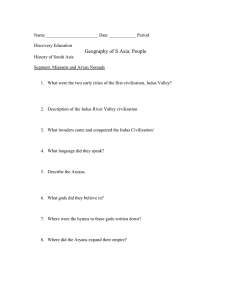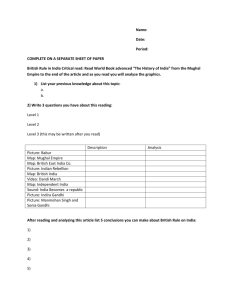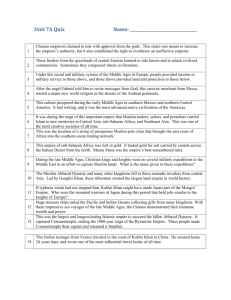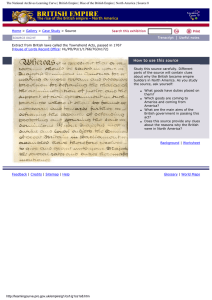4/23/2013
advertisement
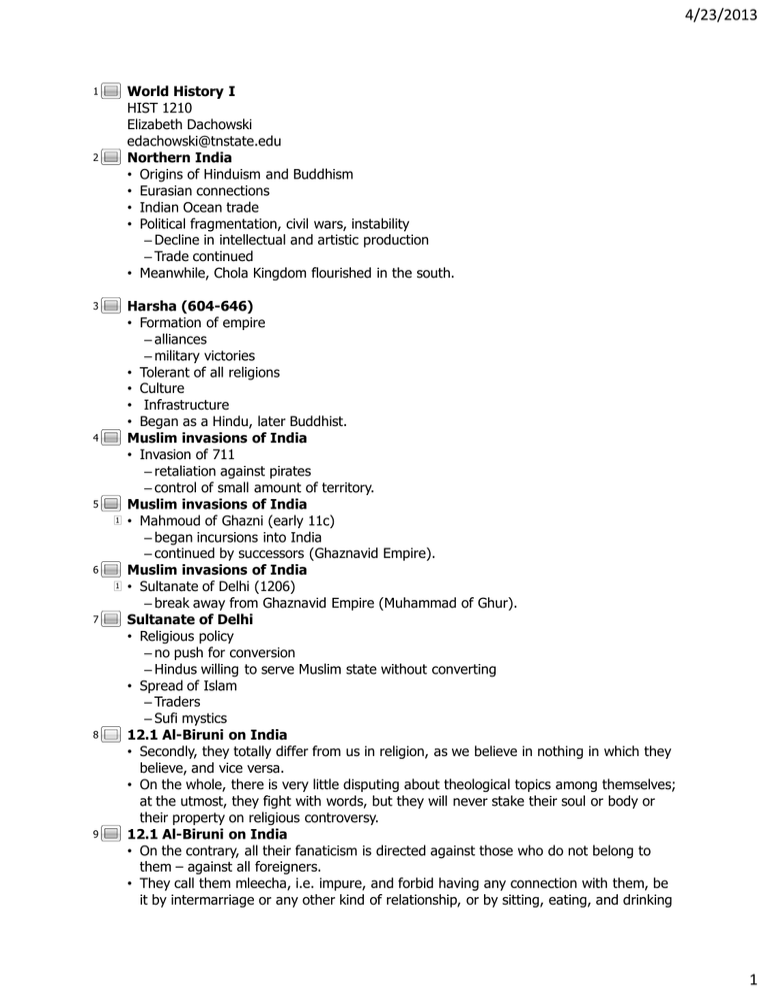
4/23/2013 World History I HIST 1210 Elizabeth Dachowski edachowski@tnstate.edu Northern India • Origins of Hinduism and Buddhism • Eurasian connections • Indian Ocean trade • Political fragmentation, civil wars, instability – Decline in intellectual and artistic production – Trade continued • Meanwhile, Chola Kingdom flourished in the south. 1 2 3 4 5 1 6 1 7 8 9 Harsha (604-646) • Formation of empire – alliances – military victories • Tolerant of all religions • Culture • Infrastructure • Began as a Hindu, later Buddhist. Muslim invasions of India • Invasion of 711 – retaliation against pirates – control of small amount of territory. Muslim invasions of India • Mahmoud of Ghazni (early 11c) – began incursions into India – continued by successors (Ghaznavid Empire). Muslim invasions of India • Sultanate of Delhi (1206) – break away from Ghaznavid Empire (Muhammad of Ghur). Sultanate of Delhi • Religious policy – no push for conversion – Hindus willing to serve Muslim state without converting • Spread of Islam – Traders – Sufi mystics 12.1 Al-Biruni on India • Secondly, they totally differ from us in religion, as we believe in nothing in which they believe, and vice versa. • On the whole, there is very little disputing about theological topics among themselves; at the utmost, they fight with words, but they will never stake their soul or body or their property on religious controversy. 12.1 Al-Biruni on India • On the contrary, all their fanaticism is directed against those who do not belong to them – against all foreigners. • They call them mleecha, i.e. impure, and forbid having any connection with them, be it by intermarriage or any other kind of relationship, or by sitting, eating, and drinking with them, because thereby, they think, they would be polluted. 10 1 9 4/23/2013 with them, because thereby, they think, they would be polluted. 12.1 Al-Biruni on India • They are not allowed to receive anybody who does not belong to them, even if he wished it, or was inclined to their religion. • This, too, renders any connection with them quite impossible, and constitutes the widest gulf between us and them. 10 11 1 2 12 13 14 15 16 • Hinduism – hierarchical – polytheistic – inclusive of other beliefs – fluid beliefs – varied practices – limited by birth • Islam – egalitarian – monotheistic – exclusive – – set beliefs – a few set practices – open to all. – Sultanate of Delhi • Converts to Islam – Buddhists – low-caste Indians – untouchables • Hindus often remained separate • Villages saw some blending of religious ideas. Sikhs • Guru Nanak (c. 1500 CE) • Blending of Muslim and Hindu elements • Beliefs and practices – monotheism – reincarnation (based on karma) – prayer and meditation – sacred text • Hostility from Hindus and Muslims. – Mughal Empire • Invasion of Timur (1398) – destroyed Sultanate of Delhi – empire died with him • Invasion of Babur (1500s) – descended from Timur – founded Mughal Empire. • Islam in Southeast Asia • Along trade routes • Sufis (Muslim mystics) 2 4/23/2013 15 16 • Sufis (Muslim mystics) • Retained many pre-Muslim traditions – folk customs/beliefs – local/traditional law. Chronology of India • Rig Veda and other Vedas (1200-700 BCE) • The Buddha (c. 500 BCE) • Mauryan Empire (322-185 BCE) • Yueh-Chih invasions (170-165 BCE) • Kushana Empire (1-155 CE--dating very uncertain) • Gupta Empire (322-540 CE) • Harsha (606-647) • Chola Kingdom (1074-1267) • Sultanate of Delhi (1181-1526) • Mughal Empire (1526-1757) 3
